WEST TAUPO
I now lived in Taumaranui and my responsibility as a Field Officer was supervising the development of four blocks on the Western side of Lake Taupo. The four blocks between them comprised about 30,000 acres. This was called pumice country from its volcanic origins. The soil was lacking in both texture and nutrients but In the early 1950s, it was discovered this could be rectified by topdressing with the trace elements Cobalt and Magnesium.
The next problem to solve was the poor health of livestock grazing the rich new pastures. After further trials, a deficiency of the trace element selenium was identified and once this was redressed, the government found itself in possession of hundreds of thousands of acres, easily converted into quality farmland. The Lands Department development scheme became an unmitigated success and over the ensuing years, hundreds of new farms were developed and balloted out to deserving young settlers.
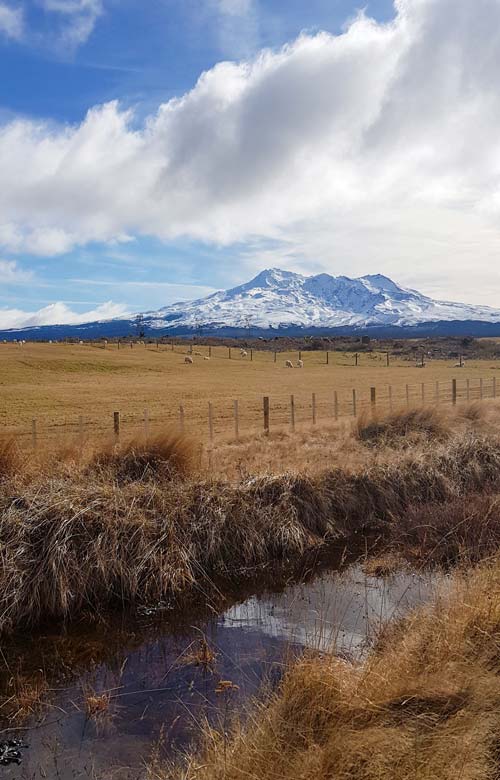
Mount Ruapehu, near lake Taupo.
The farm managers resident on each block managed the farm staff and took care of very large numbers of sheep and cattle. I was responsible for overseeing the contractors hired to carry out land clearing, water divining, well drilling, water reticulation, ground cultivation, aerial topdressing, fencing, building and the maintenance of roads and firebreaks.
You may be surprised to learn that the government paid for water diviners. I’m by nature a sceptical person and the first time I watched a diviner at work, I couldn’t help thinking “what a charade!”
He’d break a small Y shaped branch off a convenient bush, strip off the leaves and start walking with a branch of the fork held in each hand. The stem of the Y would be pointing forward. If he was lucky, his hands would start jerking, and the stem would bend sharply downwards. He’d located a water source and would confidently announce its approximate depth and the likelihood of it being permanent.
“Clever acting,” I thought, “fancy paying good money for that!” He sensed my scepticism, handed me the divining rod and invited me to walk down the newly discovered water course. The stick remained limp. “It’s a gift,” he said, “and I can’t explain it. Let’s try it together.” He directed me to hold the wand in the same way as he had but this time he didn’t touch it, but lightly held my forearm and we set off once again. This time the stick lurched down strongly; there was no way I could hold it level! He let go of my arm, and very slowly the force dissipated until the branch was limp again. There’s no way to explain this scientifically, but I’m convinced he possessed a skill that I don’t. It certainly worked for him because he also had a drilling rig and wasn’t paid unless permanent water was located and successfully reticulated to the many water troughs.
Red deer and wild pigs were well established in this region, and on one of my blocks, Whareroa station, good-sized rainbow trout came up the rivers and creeks to spawn in the autumn. I was taught by a Maori ranger how to “tickle” the trout and fling them out of the water when they’re under your spell. There’s a trick to it, and once learnt, it’s not difficult. On one occasion, the ranger and I shared a nice feed of fresh trout cooked for lunch over a small fire on the shores of the lake.
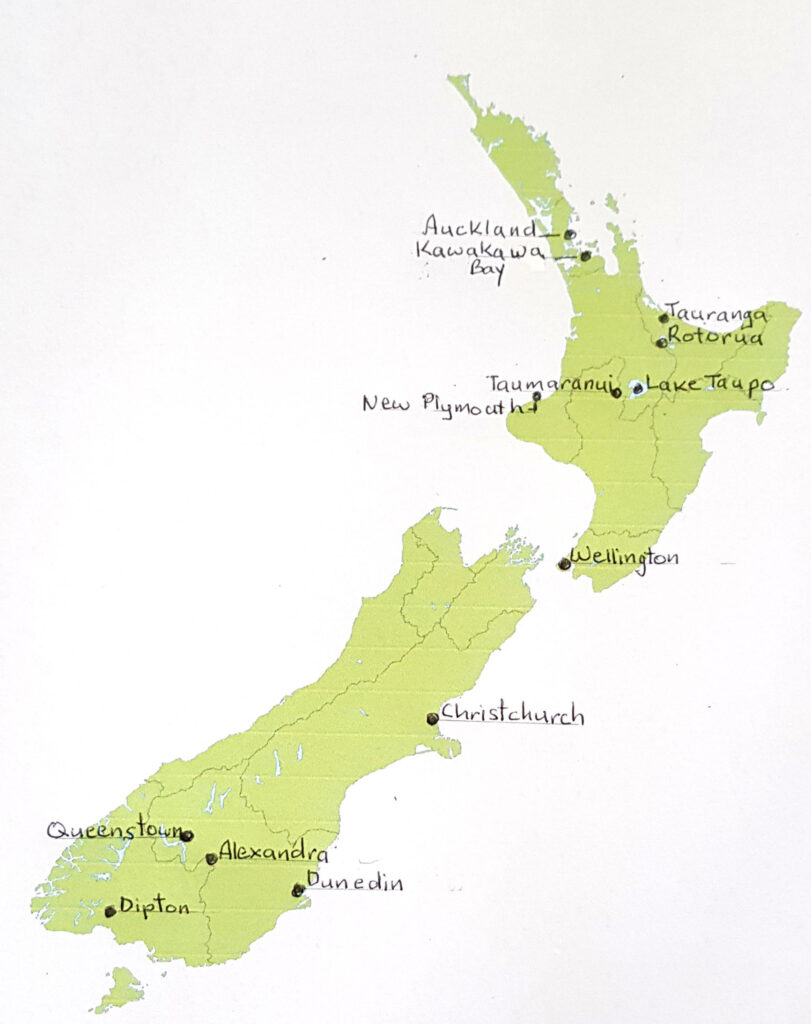
My time in this region was busy and interesting. It was a good life but an opportunity arose to apply for a similar position in the Rotorua-Bay of Plenty area. Rotorua has a lot more to offer a young person than Taumaranui, and I was lucky enough to get the job.
So I packed my possessions and headed off to a new adventure.
ROTORUA
Rotorua is one of the North Island’s well known tourist areas and is rated fifth largest in the world for the range of its geothermal activity.
It’s based in the Bay of Plenty province, so named by Captain Cook in 1769. The area must have seemed the perfect site for settlement when discovered by the migrating Polynesians more than 1,000 years ago because the population of its principal city Rotorua, is 42% Maori, compared to an average of only 16% for the rest of New Zealand.
Mount Tarawera near Rotorua erupted in the early hours of 10 June 1886. Around 120 people were killed, and many settlements were destroyed or buried. The buried village is now a tourist attraction and a sacred site worthy of a visit.
There are three other volcanoes within a 200 km radius of Rotorua and one of them, Mt Ruapehu caused the deadliest geothermal disturbance in recent NZ history. Late on Xmas Eve 1953, seismic activity caused Ruapehu’s glacier fed lake to breech and the resultant flood burst into the Whangaehu river causing the collapse of the rail bridge at Tangiwai.

Tangiwai Disaster. Tangiwai means “weeping waters” in Maori.
At 10:21pm the Wellington – Auckland Express hurtled into the river and of the 285 passengers and crew on board, 151 died. One of these was a 14 year old in my year at Hutt Valley High School named Robert Hale. He was a quiet unassuming boy travelling with his mother to spend Xmas with his grandparents in Auckland. He would have died a terrifying death.
My role after settling into the Rotorua office was the supervision of four blocks in the Whakatane and Tauranga areas. These were predominantly working livestock farms rather than land development propositions so the downside for me of moving, was swapping the frontier lifestyle of my King Country posting for a more prosaic existence in a bustling tourist centre. The upside was the social life, with parties that could end in midnight swims under the stars in natural hot pools. These were hidden away in the native land if you knew where to find them..
Soon after arrival, I was offered a house share position on Maori affairs land at Owhata with Ted Wikaira a friend from Massey. Ted was a warm good natured person and he and his girl friend Ruth were engaged to be married. Eventually the date for the wedding was set and in a few weeks Ruth would be moving in,so it was time for me to find new accommodation.
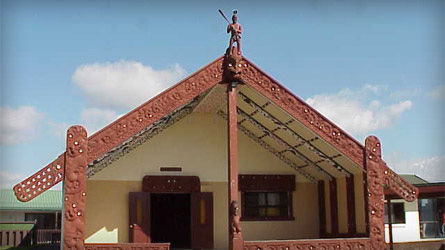
Meeting House in Tauranga Marai.
The wedding was held in the Maori Marai at Tauranga. There were a lot of hay bales set up inside the Marai for people to sit on or lie against. There was a hangi (Maori earth oven), plenty of beer and guitars and singing and dancing. From memory it lasted about two days.
Once Ruth moved in at Owhata it was time to move out. I announced my departure date but early the next morning, Ted came into my room and in his shy way said, “Ruth and I have been talking. The three of us get on so well we’re going to be lonely if you leave. We would like you to stay for as long as you like and we can continue to share the living expenses as before.” So that’s what happened and there was never a cross word spoken until the time came for me to move down south to Alexandra many months later.
After Ruth had moved in I’d see them driving away late in the evenings carrying their towels. There were no explanations and it was none of my business but they eventually told me they were going to the “Hirere” at Whaka. Hirere Ted explained, loosely means “healing” in Maori and it’s the name of a small hot pool, fenced away from the public, and widely used by the resident Maori families for bathing in private.

Whakarewarewa is a functioning Maori community.
Whakawhaka, or Whaka as the locals call it is, the name of the main geothermal activity centre in Rotorua. One of Ted’s friends, a much older man named Harold McMillan, was an elder on the Whaka tribal committee and we ritually had a flagon of beer and a chat with him at his home on Friday nights. On one of those occasions Ted asked if he and Ruth could take me with them to the Hirere. Harold said to me “make a request in writing and I’ll put it to the committee” I did so and the following Friday Harold said, “the committee have decided to let you use our Hirere. And so I was accepted.
Once or twice a week, before bed, we’d take our towels and soap, and spend half an hour or more soaking in the water under the stars, relaxing in the dark to the sound of the quiet murmur of the other bathers. These were made up of families of all ages, the women often topless, taking no notice of the skinny Pakeha (white) boy sharing their hot pool. The months went by until one night there was a guard on the gate who waved us through when he saw who we were. “There’ve been some unwanted locals causing trouble at night” he told us, “and we’ve decided we need to keep them out.”
All was well until one night a few weeks later, a different guard stopped our car. He shone his torch at me in the back seat and nodded his head then said to Ted and Ruth “he’s ok, he’s got permission from the committee you haven’t, sorry you can’t come in”. There wasn’t a word spoken as we drove back to Owhata. Ted and Ruth were visibly angry and none of the three of us ever went to the Hirere again. I think I’m right in assuming the problem was due to Ted and Ruth being Ngapuhi Maori from the North Auckland area and the Whaka people are Tuwharetoa. I’m sure this could have been sorted out by talking to Harold and the committee but they’d been rejected and were too proud to take it further.
Several months later I received a call from the Lands department in Wellington, offering an attractive financial incentive for me to apply for the position of Pastoral Land Officer in the Alexandra office in Central Otago. I accepted, and was once again leaving a posting I enjoyed to head off into the unknown.
CENTRAL OTAGO
My new office was situated in the rural town of Alexandra. Alex is a scenic oasis set among the semi arid mountains of Central Otago. Despite its Southerly latitude it enjoys some of New Zealand’s highest annual temperatures in the summer and some of the lowest in winter. Annual rainfall is low and the autumn colours and winter hoar frosts give the region a spectacular beauty in the colder months. The Manorburn dam near Alex freezes over in winter and is the only outdoor venue in NZ where the Olympic sport of Curling is played.
If you’ve been to Queenstown which is only an hour west of Alexandra, you’ll be familiar with the towering presence of the Otago mountains These properties are also very large grazing “runs” leased from the government on 33 year terms with a perpetual right of renewal. The lessees are called “run holders” and are a proud resourceful bunch who see themselves in the same light as freehold land owners, and on the whole don’t take kindly to intervention by the government.

Road to Skippers station Central Otago.
The mountains have a fragile ecology and overgrazing, or the practice of burning the native tussock, can cause erosion and invasion by noxious weeds. For these reasons the Lands and Survey Department employed a small team of Field Officers to liaise with the run holders and help maintain the status quo.
In my time there, common sense seemed to prevail and I had the opportunity to visit vast areas of mountainous back country in my official capacity with no unpleasant experiences. In fact the job had some perks. The introduction of red deer to New Zealand in the mid eighteen hundreds was an ecological mistake and in the rain forests and the South Island mountain country, the deer population is unsustainable. Deer cullers were employed by the Department of Internal Affairs and in the 1950s and early 1960s were paid a retainer of £7 a week plus four shillings per deer tail, and three shillings and sixpence per wild pig tail. These men spent long periods in the mountains with supplies dropped in by fixed-wing aircraft about every four months.
With the advent of commercial live deer or meat recovery by helicopter, and the introduction of deer farming in the 1970s, paid professional deer culling came to an end.
Once I’d shifted to the South Island I could combine deer stalking with my pastoral Lands inspection duties and the opportunities were exponential. In my visits to run-holders they would sometimes be happy to drive me around or they’d saddle up a horse for me and I’d take off on my own. If I felt it appropriate I’d ask if I could take my rifle, and no one ever refused. By the early 1960s an export market for venison had been established and clean shot meat could be sold very profitably. That was before stringent meat inspection rules for game meat were established so I was able to build a savings account that stood me in good stead when I married Rosaline in 1964.
Rosaline Peterson lived with her parents in Alex and she had established a hairdressing business. She was personable, popular and accomplished and her work kept her extremely busy.
When I moved to Central Otago I stayed at the Alexandra Hotel for three months until the Government tipped me out and said it was time I paid for my own accommodation. My boss’s wife was getting her hair cut one day and she mentioned her husband had a new employee in the office who was looking for a place to stay. Rosie happened to relate this to her mother and to the family’s surprise her mother said “I’d be happy to have a border for a while until he finds somewhere permanent.” No one was more surprised than Rosie as at this stage I was sight unseen to her or anyone else in the Peterson family. But I moved in, one thing led to another, and twelve months later Rosie and I became engaged. I was 24 and the wedding was set for the day of Rosie’s 21st birthday.
It must have been a shock to my parents when I informed them I had become engaged, and the wedding would be in five weeks time. We’d made our mind up and it suited Rosie’s parents because they had booked to go oversees for a protracted holiday and we would be able to live in their house while they were away. My poor mother must have been in a spin. By the time she got my letter, the wedding arrangements were underway and the two families wouldn’t get the chance to meet until the day before the wedding.
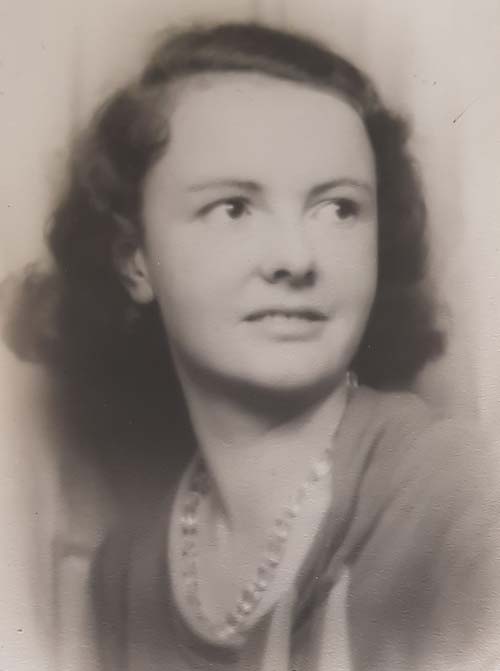
Erina Fife. nee – Adams 1917 – 1964
We had no warning of an impending tragedy.
A week or so before the wedding my mother said to dad “what’s that roaring noise?” “what noise?” said dad. There was no reply. My mum slumped to the floor. She’d suffered a cerebral hemorrhage and was never to regain consciousness.
Rosaline and I set out on the long journey to New Plymouth. There were no flights between secondary towns, so we had a six hour drive to Christchurch, an overnight ferry to Wellington, and a four hour drive to New Plymouth. Rosie’s first and only sight of my mother was lying in a hospital bed, unconscious, with a grossly swollen face. We stayed with dad and my sister for two nights then headed back to Alex and our wedding took place two days later.
It was a sad occasion. I kept myself together until Mum’s favorite hymn “Be Thou My Vision” was played during the church service. I stood choking back sobs. Real men didn’t cry.
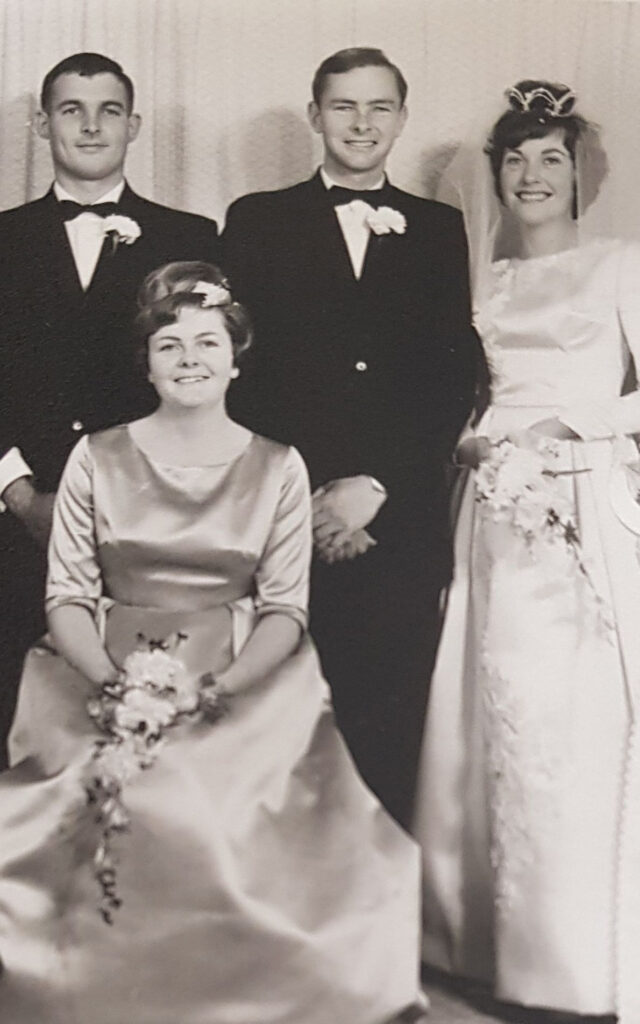
Willy Smith, Margaret, Me, Rosie.
I’d left home at fifteen years of age and had been so immersed in my own career, time spent with my parents was minimal.
Thinking back it must have been doubly sad for my sister Margaret, she was only 16 and she and mum were very close. Here she was 1200 km away while her mother lay dying.
At seven am on the morning after our wedding, mum’s brother, my uncle Bill rang to tell me that mum had passed away, so our honeymoon was spent in New Plymouth where we attended her funeral.
Life returned to normal. Mr and Mrs Peterson went on their overseas trip, Rosie and I moved into their house, and we became good friends with Rosie’s brother Peter and his wife Karen. My job was going well but something was bugging me. During a conversation with my father in New Plymouth, he had told me how lucky I was to have a good job with the Government and he advised me to hang on to it at all costs. I brooded over those comments in my youthful way for a week or two, and resolved to prove to Dad I was made of sterner stuff. I didn’t need a secure job with the Government to prove myself!
So my decision to resign from the Lands Department was an easy one. I answered an advertisement in The Southland Times for a farm managers job on a 5,200 acre hill country sheep and cattle run in Dipton, Southland. I left Alex after work one evening and drove south for a job interview in an office in Gore. I stood firm on my requirement for a £20 per week salary and after some haggling they eventually agreed. We shook hands and I had a new job, managing a property I’d never set eyes on.
I drove back to Alex thinking “That’ll show dad I don’t need a safe government job to do well in life”.
Ken Fife
November 13th 2021
Addendum
On 8th November 2021, five days before signing off on this blog, my ex-wife Rosaline passed away in Christchurch New Zealand after a long battle with Alzheimer’s.
Rosie was a town girl when we met and she became a farmers wife after we married. Our daughter Nicola was born eleven months after our wedding, Joanna followed and then Graeme. We now had three children under three years old. I was totally immersed in running the farm while Rosie uncomplainingly looked after the children, cooked for shearers and farm staff, and coped with everything that was thrown at her. In the early years, our life was a difficult struggle financially but she never complained. She is sadly missed.
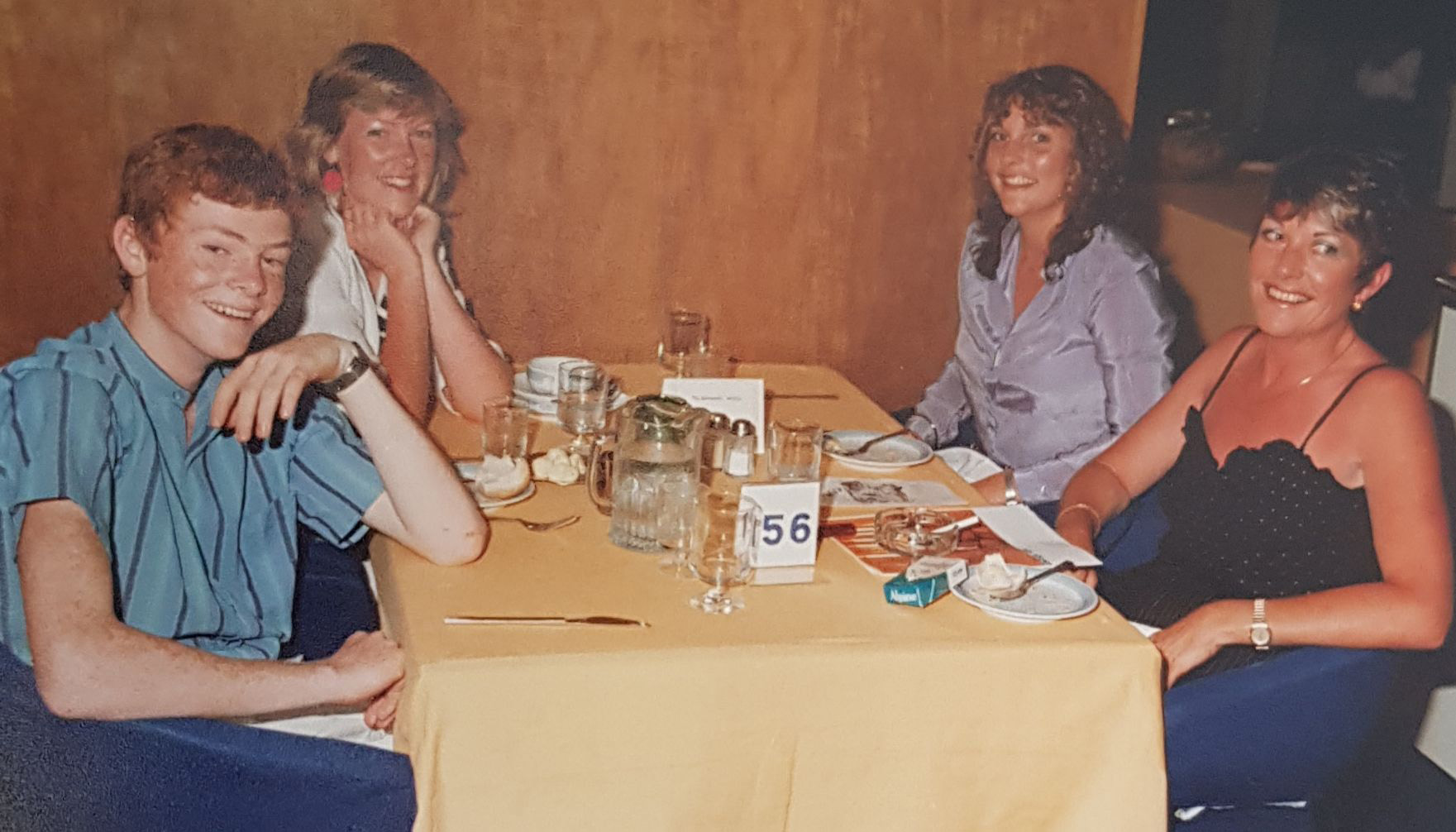
Graeme, Nicola, Joanna, and Rosaline – 1982.
